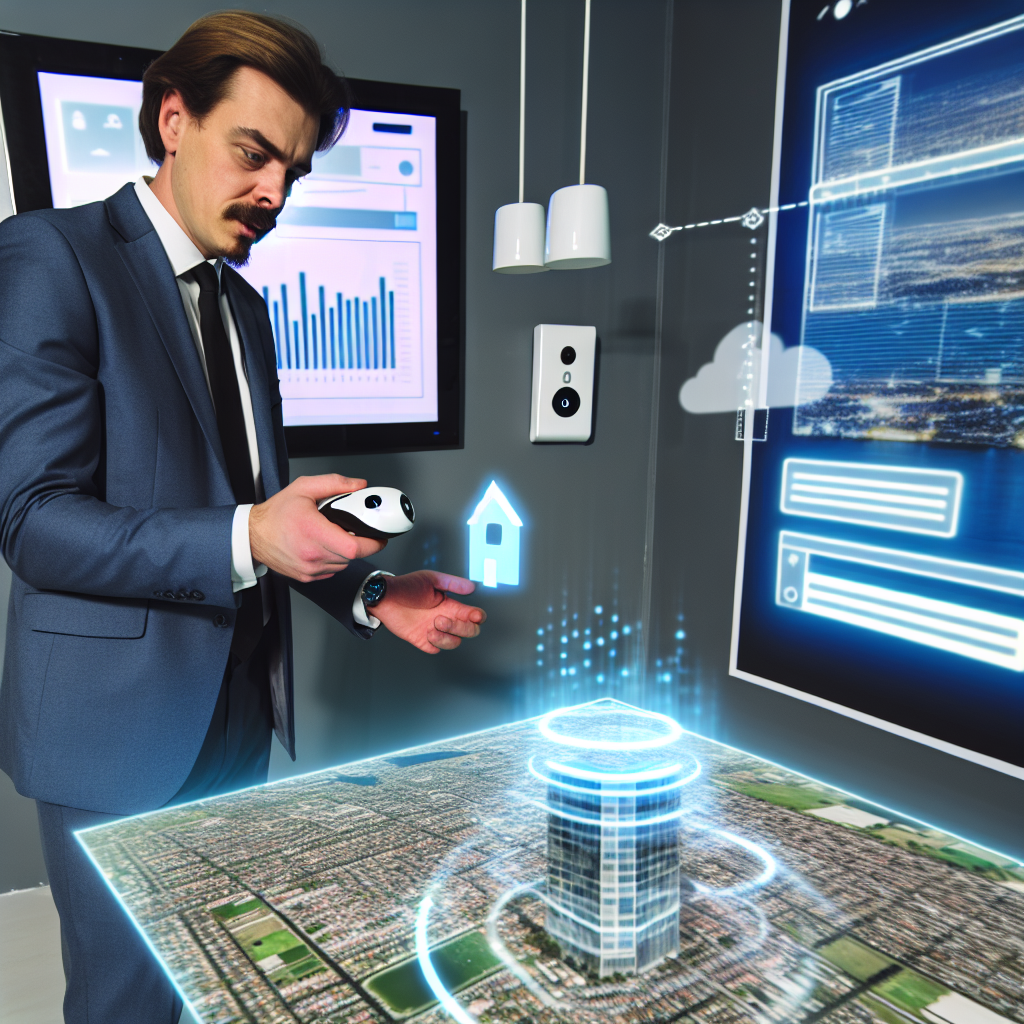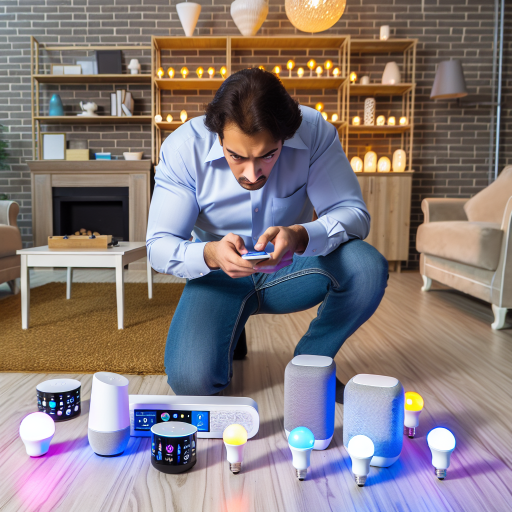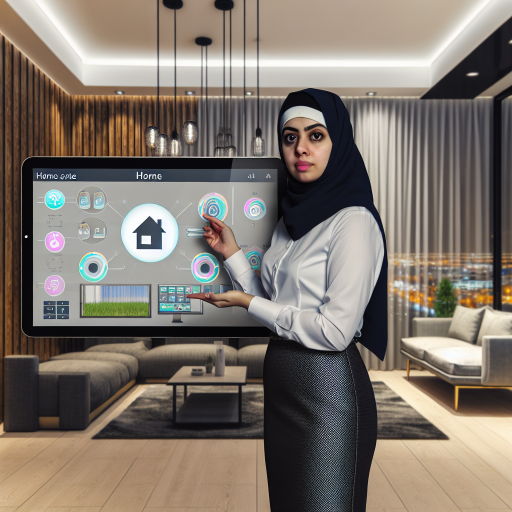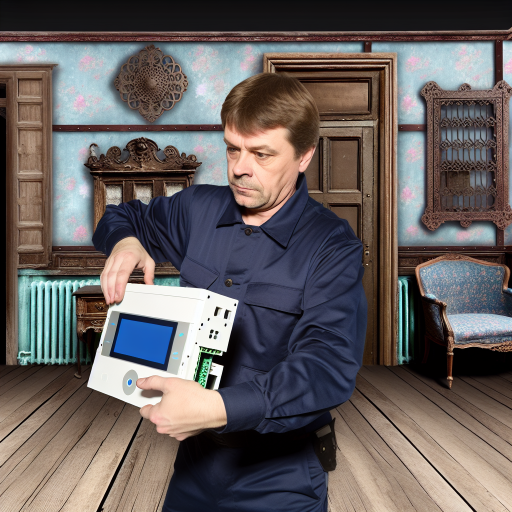Introduction to IoT in Real Estate and Its Significance
The Internet of Things (IoT) is transforming the real estate industry.
This technology connects various devices within properties to the internet.
As a result, property managers gain insights into building performance.
Furthermore, IoT enhances operational efficiency and tenant comfort.
For instance, smart thermostats optimize energy consumption.
Security systems bolster building safety through real-time monitoring.
Moreover, smart sensors track maintenance needs before issues escalate.
This proactive management saves costs and improves tenant satisfaction.
The significance of IoT goes beyond simple automation.
It enables data-driven decision-making for property owners.
Additionally, IoT devices generate valuable analytics for future investments.
These insights help refine property management strategies.
Consequently, the value of real estate assets can increase over time.
In summary, IoT revolutionizes property management practices.
This technology ultimately creates a smarter, more responsive real estate landscape.
Overview of PropTech
Definition of PropTech
PropTech, short for property technology, refers to the use of technology in real estate.
It integrates innovative solutions to improve property management and investment processes.
This field encompasses various applications, from financial tools to IoT devices.
Key Components of PropTech
Several core components define PropTech. These include software applications, IoT devices, and big data analytics.
Software applications streamline functions like property management and tenant communication.
IoT devices enhance monitoring and energy management within buildings.
Big data analytics provide insights for better decision-making in real estate investments.
Benefits of PropTech
PropTech offers multiple benefits to the real estate industry.
It improves efficiency, reduces costs, and enhances tenant experience.
Additionally, it fosters sustainable practices through energy management and smart building technologies.
Examples of PropTech Solutions
Various companies provide innovative PropTech solutions.
Smart home devices, such as thermostats and security systems, are popular in residential properties.
Cloud-based property management platforms facilitate communication between landlords and tenants.
Real estate marketplaces and platforms enable easy buying, selling, or renting of properties.
The Role of IoT-Enabled Devices in Property Management
Enhancing Operational Efficiency
IoT-enabled devices significantly enhance operational efficiency in property management.
These devices automate routine tasks, reducing the need for manual intervention.
For example, smart thermostats automatically adjust heating and cooling based on occupancy.
This not only improves tenant comfort but also cuts down energy costs.
Furthermore, automated lighting systems respond to natural light levels, optimizing energy use.
Improving Tenant Experience
Tenant experience improves significantly with IoT-enabled technology.
Smart security systems offer enhanced safety through remote monitoring and alerts.
Additionally, remote access for residents provides convenience, allowing guests without physical keys.
IoT devices also facilitate timely maintenance requests through integrated platforms.
This leads to faster resolution of issues, ultimately increasing tenant satisfaction.
Supporting Data-Driven Decisions
Data collection plays a vital role in property management success.
IoT devices collect valuable data about property usage patterns.
This information aids in identifying trends that inform strategic planning.
For instance, sensors can track foot traffic in common areas to optimize management efforts.
Moreover, predictive analytics helps property managers anticipate maintenance needs before they arise.
Enabling Sustainability Practices
Sustainability is a key focus in modern property management.
IoT devices contribute by monitoring and controlling resource use effectively.
Smart water meters track usage and detect leaks, promoting conservation.
Similarly, energy management systems optimize consumption across the property.
Ultimately, these practices minimize environmental impact and reduce operational costs.
Find Out More: Maximizing Home Security With Advanced Integrated Smart Surveillance Solutions
Benefits of Implementing IoT Technologies in Real Estate Management
Enhanced Operational Efficiency
IoT devices streamline daily operations in real estate management.
They automate tasks such as temperature control and lighting systems.
This automation significantly reduces energy consumption.
As a result, property managers can focus on strategic responsibilities.
Improved Tenant Experience
IoT technologies enhance the living experience for tenants.
Smart home devices allow tenants to control utilities remotely.
Additionally, automated maintenance systems ensure quick response to issues.
Tenant satisfaction increases when their comfort needs are met efficiently.
Cost Savings Over Time
Investing in IoT solutions leads to long-term cost savings.
Smart devices decrease energy and operational costs.
Over time, the return on investment becomes clear and substantial.
Moreover, proactive maintenance prevents costly repairs down the line.
Data-Driven Decision Making
IoT devices provide valuable data for property managers.
They collect and analyze usage patterns across facilities.
This information aids in optimizing resource allocation and planning.
Consequently, data-driven decisions lead to better management outcomes.
Increased Security Measures
IoT security systems enhance the safety of real estate properties.
Smart surveillance cameras and alarms deter potential intruders.
Moreover, real-time alerts keep property managers informed of issues.
Safe environments attract and retain tenants effectively.
Scalability and Flexibility
IoT devices allow for easy scalability within property management.
New devices can be added without extensive infrastructure changes.
This flexibility accommodates expanding portfolios or changing demands.
As a result, property managers can adapt quickly and efficiently.
Discover More: PropTech Applications That Are Redefining Real Estate Transactions
Challenges and Limitations of IoT Adoption in the Real Estate Sector
High Initial Costs
One significant challenge is the high initial costs associated with IoT devices.
Many real estate companies struggle to allocate budgets for these technologies.
Investments often include hardware, software, and installation expenses.
This financial burden can deter smaller firms from adopting IoT solutions.
Data Privacy and Security Concerns
Data privacy and security represent major concerns in IoT adoption.
Real estate companies collect vast amounts of sensitive data.
Cybersecurity threats pose risks to both the firms and their clients.
Companies must invest in robust security measures to mitigate risks.
Interoperability Issues
Interoperability among different IoT devices can be problematic.
Many devices operate on varying protocols and standards.
This fragmentation complicates system integration and data exchange.
Real estate managers often face challenges in achieving seamless connections.
Lack of Skilled Professionals
A shortage of skilled professionals inhibits IoT adoption.
Many companies cannot find experts knowledgeable in IoT technologies.
Training existing staff requires time and resources that some firms lack.
This skill gap slows down the implementation of IoT-driven solutions.
Regulatory and Compliance Issues
Regulatory frameworks for IoT are still developing.
Companies often navigate a complex landscape of regulations.
Compliance with local and national laws can be challenging.
This uncertainty may lead to hesitation in deploying IoT technologies.
Market Resistance and Slow Adoption Rates
Market resistance exists due to a lack of awareness about IoT benefits.
Many stakeholders are skeptical about the technology’s effectiveness.
Consequently, adoption rates can be slower than anticipated.
Education and demonstration of value can help overcome this resistance.
Delve into the Subject: How Drones Are Enhancing Property Marketing Strategies

Successful IoT Deployments in Property Management
Case Study: Smart Home Solutions
SmartHome Innovations recently transformed a residential complex in Seattle.
This project utilized IoT-enabled devices to enhance tenant experience.
Residents now control lighting, temperature, and security through a mobile app.
Furthermore, predictive maintenance alerts help property managers address issues proactively.
As a result, tenant satisfaction increased by 30% within six months.
Case Study: Building Automation Systems
EcoBuild Technologies implemented advanced building automation in a commercial office in Chicago.
They integrated IoT sensors to monitor energy consumption efficiently.
Real-time data enables property managers to optimize energy use.
Consequently, the building achieved a 40% reduction in energy costs in one year.
Moreover, the system reports maintenance needs, minimizing downtime and enhancing productivity.
Case Study: IoT in Retail Spaces
RetailTech Solutions enabled smart technology in a major retail chain across New York.
The deployment featured smart sensors tracking foot traffic and inventory levels.
Insights derived from this data allowed for better stock management.
Thus, sales experienced a significant boost due to optimized product placement.
Additionally, customer engagement improved through personalized shopping experiences.
Case Study: Enhanced Security Systems
SecureSpace Technologies partnered with a multi-unit housing provider in Los Angeles.
The installation of smart locks and security cameras improved safety and accessibility.
Residents can now grant access remotely to guests or maintenance staff.
Furthermore, real-time alerts enhance the security response time.
This deployment resulted in a 50% decrease in unauthorized access incidents.
Case Study: IoT for Aging Populations
HealthTech Housing Solutions implemented IoT devices in an assisted living facility in Austin.
Wearable health monitors track residents’ vital signs continuously.
Emergency alerts streamline communication with caregivers and medical professionals.
This technology significantly improved response times during health emergencies.
Residents reported feeling safer and more independent, enhancing their quality of life.
You Might Also Like: How PropTech Is Changing The Way Americans Buy And Sell Homes
Future Trends of IoT and PropTech in Real Estate Management
Integration of Smart Technology
The integration of IoT devices is revolutionizing real estate management.
Smart technology streamlines property operations and enhances efficiency.
This trend allows for automated monitoring of various property aspects.
For example, smart thermostats optimize energy consumption in buildings.
Consequently, building managers can reduce operational costs.
Data-Driven Decision Making
Data analytics plays a crucial role in modern real estate management.
IoT devices collect vast amounts of data in real time.
This data enables property managers to make informed decisions.
Moreover, predictive analytics helps anticipate maintenance needs.
As a result, properties can maintain higher operational efficiency.
Enhancing Tenant Experience
The use of IoT devices significantly enhances tenant experiences.
Smart locks offer secure and flexible access to buildings.
Additionally, tenants enjoy smart home features for comfort.
For instance, app-controlled lighting and temperature settings improve satisfaction.
Overall, these enhancements can lead to higher tenant retention.
Sustainability Initiatives
The trend toward sustainability is becoming increasingly prominent.
IoT technology promotes energy-efficient practices in properties.
Automated systems can regulate energy use based on real-time data.
This reduces carbon footprints while lowering utility expenses.
Ultimately, sustainable buildings attract environmentally conscious tenants.
Security and Surveillance Improvements
IoT devices enhance security and surveillance in real estate management.
Smart cameras and sensors provide real-time monitoring capabilities.
Property managers receive instant alerts for suspicious activities.
Additionally, automated access management enhances building security.
These improvements instill greater confidence among tenants and owners.
Challenges and Considerations
Despite its benefits, adopting IoT technology comes with challenges.
Data privacy and security are significant concerns for property managers.
Moreover, integration costs can be a barrier for some organizations.
As such, proper planning and strategy are essential for success.
Forward-thinking approaches can mitigate these challenges effectively.
The Impact of IoT on Tenant Experience and Satisfaction
Enhancing Comfort and Convenience
IoT-enabled devices significantly improve tenant comfort and convenience.
Smart thermostats allow tenants to control heating and cooling remotely.
This feature optimizes energy usage while enhancing comfort levels.
Smart lighting systems adjust automatically to the time of day.
Consequently, tenants enjoy a well-lit and energy-efficient living space.
Moreover, automated shading systems block excess sunlight.
This adjustment maintains a comfortable indoor temperature.
Improving Security and Safety
Security is a top priority for tenants.
IoT devices like smart locks and surveillance cameras enhance safety.
Tenants can monitor their properties in real-time from their smartphones.
Furthermore, smart alarms notify tenants immediately of potential intrusions.
Such features instill confidence and peace of mind in residents.
Streamlined Communication and Maintenance
IoT devices improve communication between tenants and property management.
Smart home systems alert management to maintenance issues immediately.
This prompt reporting reduces wait times for repairs.
Additionally, communication apps facilitate direct contact with management.
As a result, tenants feel more connected and heard.
Access to Data and Analytics
IoT devices produce valuable data about tenant habits.
This data helps property managers make informed decisions.
For example, analyzing energy consumption enables better utility management.
Moreover, trends in tenant usage can guide amenity enhancements.
Therefore, property managers can tailor services to meet tenant needs more effectively.
Creating a Sense of Community
IoT solutions can foster community engagement among tenants.
Smart bulletin boards and community apps connect residents.
Such platforms promote events, activities, and shared interests.
As a result, tenants feel a sense of belonging within their living spaces.
This sense of community enhances overall tenant satisfaction.
Additional Resources
Real Estate| Proptech | Nuveen Real Estate | Nuveen
Artificial intelligence – implications for real estate | JLL Research




